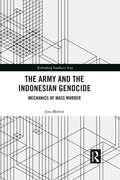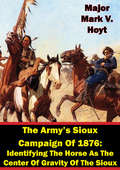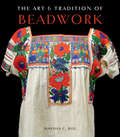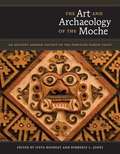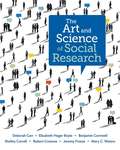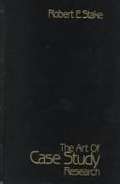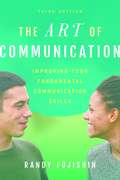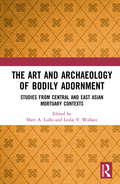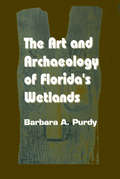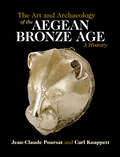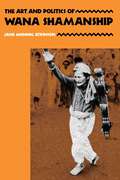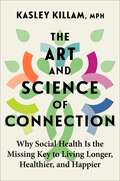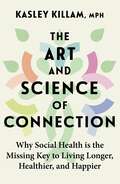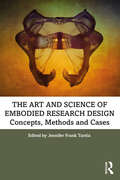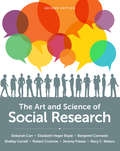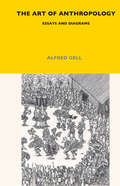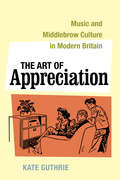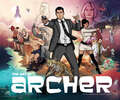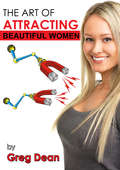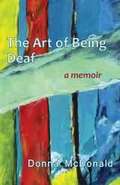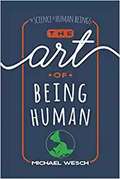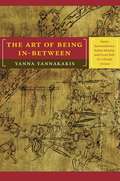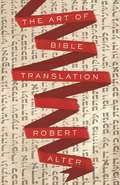- Table View
- List View
The Army and the Indonesian Genocide: Mechanics of Mass Murder (Rethinking Southeast Asia)
by Jess MelvinFor the past half century, the Indonesian military has depicted the 1965-66 killings, which resulted in the murder of approximately one million unarmed civilians, as the outcome of a spontaneous uprising. This formulation not only denied military agency behind the killings, it also denied that the killings could ever be understood as a centralised, nation-wide campaign. Using documents from the former Indonesian Intelligence Agency’s archives in Banda Aceh this book shatters the Indonesian government’s official propaganda account of the mass killings and proves the military’s agency behind those events. This book tells the story of the 3,000 pages of top-secret documents that comprise the Indonesian genocide files. Drawing upon these orders and records, along with the previously unheard stories of 70 survivors, perpetrators, and other eyewitness of the genocide in Aceh province it reconstructs, for the first time, a detailed narrative of the killings using the military’s own accounts of these events. This book makes the case that the 1965-66 killings can be understood as a case of genocide, as defined by the 1948 Genocide Convention. The first book to reconstruct a detailed narrative of the genocide using the army’s own records of these events, it will be of interest to students and academics in the field of Southeast Asian Studies, History, Politics, the Cold War, Political Violence and Comparative Genocide.
The Army’s Sioux Campaign of 1876: Identifying the Horse as the Center of Gravity of the Sioux
by Major Mark V. HoytDuring the first half of 1876 the Army conducted three expeditions against the Sioux and Cheyenne Indians. The results of these three expeditions were: the first expedition destroying a small village, the second expedition being defeated in a meeting engagement, and the third expedition suffering the annihilation of five companies. The results lead to questioning the Army's focus on attacking and destroying villages as the primary target of their expeditions. If the Army had a complete understanding of the Sioux they would have realized that the "hub of all power" or center of gravity of the Sioux was the horse, which every major aspect of Sioux life was augmented and dependent upon. The first three expeditions of the Sioux Campaign of 1876 demonstrate that: senior Army commanders planned their campaigns, expeditions, and organizations around their knowledge of Sioux mobility, the primary source of power for the Sioux warrior was mobility gained from the horse, Army forces could not bring their advantage in firepower to bear on Sioux warriors. Army commanders understood the mobility of the Sioux village and their warriors, but they failed to take the next step--challenging the old assumption that attacking villages and using a strategy of exhaustion was the correct way to subdue the Sioux. Instead, Army forces should have concentrated their attacks on center of gravity of the Sioux--the horse.
The Art & Tradition of Beadwork
by Marsha C. BolA former professor and museum director offers a fascinating, in-depth look at the culture and history of beaded objects around the world. From a beaded dress found in an ancient Egyptian tomb to the beaded fringe on a 1920s Parisian flapper&’s hem, humans throughout history have used beading as a way to express, adorn, and tell a story. Bol explores beadwork across the world and through the ages, showing how beading has taken on many different styles, forms, and purposes for different cultures. She looks at children&’s clothing, puberty ceremonies, burials, emblems of social status and leadership, festivals, and many other cultural occasions that involve the use of beadwork. Images of artifacts and heirlooms as well as photography of people and their beadwork enhance the scholarship of this book for a beautiful, enlightening addition to art, history, multicultural collections everywhere.
The Art And Archaeology of the Moche: An Ancient Andean Society of the Peruvian North Coast
by Steve Jones Bourget Kimberly L.Renowned for their monumental architecture and rich visual culture, the Moche inhabited the north coast of Peru during the Early Intermediate Period (AD 100-800). Archaeological discoveries over the past century and the dissemination of Moche artifacts to museums around the world have given rise to a widespread and continually increasing fascination with this complex culture, which expressed its beliefs about the human and supernatural worlds through finely crafted ceramic and metal objects of striking realism and visual sophistication. In this standard-setting work, an international, multidisciplinary team of scholars who are at the forefront of Moche research present a state-of-the-art overview of Moche culture. The contributors address various issues of Moche society, religion, and material culture based on multiple lines of evidence and methodologies, including iconographic studies, archaeological investigations, and forensic analyses. Some of the articles present the results of long-term studies of major issues in Moche iconography, while others focus on more specifically defined topics such as site studies, the influence of El Niño/Southern Oscillation on Moche society, the nature of Moche warfare and sacrifice, and the role of Moche visual culture in decoding social and political frameworks.
The Art And Science Of Social Research
by Robert Crosnoe Mary C. Waters Deborah Carr Benjamin Cornwell Elizabeth Heger Boyle Shelley Correll Jeremy FreeseWritten by a team of internationally renowned sociologists with experience in both the field and the classroom, The Art and Science of Social Research offers authoritative and balanced coverage of the full range of methods used to study the social world. The authors highlight the challenges of investigating the unpredictable topic of human lives while providing insights into what really happens in the field, the laboratory, and the survey call center.
The Art Of Case Study Research
by Robert E. Stake<P>This book presents a disciplined, qualitative exploration of case study methods by drawing from naturalistic, holistic, ethnographic, phenomenological and biographic research methods.<P> Robert E. Stake uses and annotates an actual case study to answer such questions as: How is the case selected?<P> How do you select the case which will maximize what can be learned?<P> How can what is learned from one case be applied to another?<P> How can what is learned from a case be interpreted? <P>In addition, the book covers: the differences between quantitative and qualitative approaches; data-gathering including document review; coding, sorting and pattern analysis; the roles of the researcher; triangulation; and reporting.
The Art Of Communication: Improving Your Fundamental Communication Skills (Third Edition)
by Randy FujishinThis third edition of The Art of Communication (previously titled Creating Communication) is a brief and practical introduction to speech communication. Emphasizing face-to-face communication, yet also addressing the role of technology and its influence on daily communication, Fujishin helps you develop greater understanding of how important communication skills are in your personal and professional life--and will inspire you to use these skills in ways that enlarge and improve the lives of others as well as your own. Fujishin employs a distinctively encouraging and conversational approach as he explains the basic communication skills necessary to improve in numerous contexts--including public speaking, small group, interpersonal, intercultural, leadership, interviewing, and technology-based communication. The result is an easy-to-read book that provides the tools to implement powerful changes in the ways you interact with others.
The Art and Archaeology of Ancient Greece
by Judith M. BarringerThe Art and Archeology of Ancient Greece is an introductory-level textbook for students with little or no background in ancient art. Arranged chronologically in broad swathes of time, from the Bronze and Iron Ages through the Geometric, Archaic, Classical, and Hellenistic periods, and concluding with the Roman conquest of the Greek world, the textbook focuses on Greek art but also incorporates Near Eastern, Etruscan, and Roman objects. Judith M. Barringer examines a variety of media, analyzing marble and bronze sculpture, public architecture, and vase painting, as well as coins, domestic architecture, mosaics, terracotta figurines and reliefs, jewelry, and wall painting. This book adopts an approach that considers objects and monuments within their cultural contexts. * More than 500 illustrations, with over 400 in color and 13 maps, including specially commissioned photographs, maps, plans, and reconstructions * Includes text boxes, chapter summaries and timelines, and detailed glossary * Looks at Greek art from perspectives of both art history and archaeology, giving students an understanding of the historical and everyday context of art objects
The Art and Archaeology of Bodily Adornment: Studies from Central and East Asian Mortuary Contexts
by Sheri A. Lullo Leslie V. WallaceThe Art and Archaeology of Bodily Adornment examines the significance of adornment to the shaping of identity in mortuary contexts within Central and East Asia and brings these perspectives into dialogue with current scholarship in other worldwide regions. Adornment and dress are well-established fields of study for the ancient world, particularly with regard to Europe and the Americas. Often left out of this growing discourse are contributions from scholars of Central and East Asia. The mortuary contexts of focus in this volume represent unique sites and events where identity was visualized, and often manipulated and negotiated, through material objects and their placement on and about the deceased body. The authors examine ornaments, jewelry, clothing, and hairstyles to address questions of identity construction regarding dimensions such as gender and social and political status, and transcultural exchange from burials of prehistoric and early historical archaeological sites in Central Asia, China, Korea, and Japan. In both breadth and depth, this book will be of interest to students and scholars interested in the archaeology, art, and history of Central and East Asia, as well as anyone interested in the general study of dress and adornment.
The Art and Archaeology of Florida's Wetlands
by BarbaraA. PurdyWaterlogged archaeological sites in Florida contain tools, art objects, dietary items, human skeletal remains, and glimpses of past environments that do not survive the ravages of time at typical terrestrial sites. Unfortunately, archaeological wet sites are invisible since their preservation depends upon their entombment in oxygen-free, organic deposits. As a result, they are often destroyed accidentally during draining, dredging, and development projects. These sites and the objects they contain are an important part of Florida's heritage. They provide an opportunity to learn how the state's earliest residents used available resources to make their lives more comfortable and how they expressed themselves artistically. Without the wood carvings from water-saturated sites, it would be easy to think of early Floridians as culturally impoverished because Florida does not have stone suitable for creating sculptures. This book compiles in one volume detailed accounts of such famous sites as Key Marco, Little Salt Spring, Windover, Ft. Center, and others. The book discusses wet site environments and explains the kinds of physical, chemical, and structural components required to ensure that the proper conditions for site formation are present and prevail through time. The book also talks about how to preserve artifacts that have been entombed in anaerobic deposits and the importance of classes of objects, such as wooden carvings, dietary items, human skeletal remains, to our better understanding of past cultures. Until now this information has been scattered in obscure documents and articles, thus diminishing its importance. Our ancestors may not have been Indians, but they contributed to the state's heritage for more than 10,000 years. Once disturbed by ambitious dredging and draining projects, their story is gone forever; it cannot be transplanted to another location.
The Art and Archaeology of the Aegean Bronze Age: A History
by Jean-Claude PoursatThe Art and Archaeology of the Aegean Bronze Age offers a comprehensive chronological and geographical overview of one of the most important civilizations in human history. Jean-Claude Poursat's volume provides a clear path through the rich and varied art and archaeology of Aegean prehistory, from the Neolithic period down to the end of the Bronze Age. Charting the regional differences within the Aegean world, his study covers the full range of material evidence, including architecture, pottery, frescoes, metalwork, stone, and ivory, all lucidly arranged by chapter. With nearly 300 illustrations, this volume is one of the most lavishly illustrated treatments of the subject yet published. Suggestions for further reading provide an up-to-date entry point to the full richness of the subject. Originally published in French, and translated by the author's collaborator Carl Knappett, this edition makes Poursat's deep knowledge of the Aegean Bronze Age available to an English-language audience for the first time.
The Art and Politics of Wana Shamanship
by Jane Monnig AtkinsonRituals are valued by students of culture as lenses for bringing facets of social life and meaning into focus. Jane Monnig Atkinson's carefully crafted study offers unique insight into the rich shamanic ritual tradition of the Wana, an upland population of Sulawesi, Indonesia.
The Art and Science of Connection: Why Social Health Is the Missing Key to Living Longer, Healthier, and Happier
by Kasley KillamA groundbreaking redefinition of what it means to be healthy that introduces the need for social health—the part of wellbeing that comes from feeling connected—to truly flourish.Exercise. Eat a balanced diet. Go to therapy. Most wellness advice is focused on achieving and maintaining good physical and mental health. But Harvard-trained social scientist and pioneering social health expert Kasley Killam reveals that this approach is missing a vital component: human connection. Relationships not only make us happier, but also are critical to our overall health and longevity. Research shows that people with a strong sense of belonging are 2.6 times more likely to report good or excellent health. Perhaps even more astonishingly, people who lack social support are up to 53% more likely to die from any cause. Yet social health has been overlooked and underappreciated—until now.Just as we exercise our physical muscles, we can strengthen our social muscles. Weaving together cutting-edge science, mindset shifts, and practical wisdom, Killam offers the first methodology for how to be socially healthy. An antidote to the loneliness epidemic and an inspiring manifesto for seeing wellbeing as not only physical and mental, but also social, The Art and Science of Connection is a handbook for thriving. In this essential book, you will:Learn a simple yet powerful framework to understand, evaluate, and bolster your social health.Discover the exact strategy or habit you need, as well as research-backed tips, to cultivate and sustain meaningful connection now and throughout your life.Glean actionable insights to develop a sense of community in your neighborhood, at work, and online from a spirited group of neighbors in Paris, the CEO of a major healthcare company, and an artificially intelligent chatbot.Get an insider look at the innovative ways that doctors, teachers, entrepreneurs, architects, government leaders, and everyday people are catalyzing a movement toward a more socially healthy society.The Art and Science of Connection will transform the way you think about each interaction with a friend, family member, coworker, or neighbor, and give you the tools you need to live a more connected and healthy life—whether you are an introvert or extrovert, if you feel stretched thin, and no matter your age or background. Along the way, Killam will reveal how a university student, a newlywed, a working professional, and a retired widow overcame challenges to thrive through connection—and how you can, too.
The Art and Science of Connection: Why Social Health is the Missing Key to Living Longer, Healthier, and Happier
by Kasley KillamA groundbreaking redefinition of what it means to be healthy that introduces the need for social health - the part of wellbeing that comes from feeling connected - to truly flourish.Exercise. Eat a balanced diet. Go to therapy. Most wellness advice is focused on achieving and maintaining good physical and mental health. But Harvard-trained social scientist and pioneering social health expert Kasley Killam reveals that this approach is missing a vital component: human connection.Relationships not only make us happier, but also are critical to our overall health and longevity. Research shows that people with a strong sense of belonging are 2.6 times more likely to report good or excellent health. Perhaps even more astonishingly, people who lack social support are up to 53% more likely to die from any cause. Yet social health has been overlooked and underappreciated - until now.Just as we exercise our physical muscles, we can strengthen our social muscles. Weaving together cutting-edge science, mindset shifts, and practical wisdom, Killam offers the first methodology for how to be socially healthy. An antidote to the loneliness epidemic and an inspiring manifesto for seeing wellbeing as not only physical and mental, but also social, The Art and Science of Connection is a handbook for thriving.In this essential book, you will:- Learn a simple yet powerful framework to understand, evaluate, and bolster your social health.- Discover the exact strategy or habit you need, as well as research-backed tips, to cultivate and sustain meaningful connection now and throughout your life.- Glean actionable insights to develop a sense of community in your neighbourhood, at work, and online from a spirited group of neighbours in Paris, the CEO of a major healthcare company, and an artificially intelligent chatbot.- Get an insider look at the innovative ways that doctors, teachers, entrepreneurs, architects, government leaders, and everyday people are catalysing a movement toward a more socially healthy society.The Art and Science of Connection will transform the way you think about each interaction with a friend, family member, coworker, or neighbour, and give you the tools you need to live a more connected and healthy life - whether you are an introvert or extrovert, if you feel stretched thin, and no matter your age or background. Along the way, Killam will reveal how a university student, a newlywed, a working professional, and a retired widow overcame challenges to thrive through connection-and how you can, too.
The Art and Science of Embodied Research Design: Concepts, Methods and Cases
by Edited by Jennifer Frank TantiaThe Art and Science of Embodied Research Design: Concepts, Methods, and Cases offers some of the nascent perspectives that situate embodiment as a necessary element in human research. This edited volume brings together philosophical foundations of embodiment research with application of embodied methods from several disciplines. The book is divided into two sections. Part I, Concepts in Embodied Research Design, suggests ways that embodied epistemology may bring deeper understanding to current research theory, and describes the ways in which embodiment is an integral part of the research process. In Part II, Methods and Cases, chapters propose novel ways to operationalize embodied data in the research process. The section is divided into four sub-sections: Somatic Systems of Analysis, Movement Systems of Analysis, Embodied Interviews and Observations, and Creative and Mixed Methods. Each chapter proposes a method case; an example of a previously used research method that exemplifies the way in which embodiment is used in a study. As such, it can be used as scaffold for designing embodied methods that suits the researcher’s needs. It is suited for many fields of study such as psychology, sociology, behavioral science, anthropology, education, and arts-based research. It will be useful for graduate coursework in somatic studies or as a supplemental text for courses in traditional research design.
The Art and Science of Social Research (Second Edition)
by Robert Crosnoe Mary C. Waters Deborah Carr Benjamin Cornwell Elizabeth Heger Boyle Shelley Correll Jeremy FreeseShow your students how social research really unfolds. Written by a team of renowned sociologists with experience in both the field and the classroom, The Art and Science of Social Research offers authoritative, accessible, and balanced coverage of the methods used to study the social world. The authors highlight the challenges of investigating the unpredictable topic of human lives while providing insights into what really happens in the field, the laboratory, and the survey call center. This purchase offers access to the digital ebook only.
The Art and Science of Teaching Orientation and Mobility to Persons with Visual Impairments
by William H. JacobsonTeaching orientation, mobility and space perception to blind people.
The Art of Anthropology: Essays and Diagrams (London School Of Economics Monographs On Social Anthropology Ser. #Vol. 67)
by Alfred GellThe Art of Anthropology collects together the most influential of Gell's writings, which span the past two decades, with a new introductory chapter written by Gell. The essays vividly demonstrate Gell's theoretical and empirical interests and his distinctive contribution to several key areas of current anthropological enquiry. A central theme of the essays is Gel's highly original exploration of diagrammatic imagery as the site where social relations and cognitive processes converge and crystallise. Gell tracks this imagery across studies of tribal market transactions, dance forms, the iconicity of language and his most recent and groundbreaking analyses of artworks.Written with Gell's characteristic fluidity and grace and generously illustrated with Gell's original drawings and diagrams, the book will interest art historians, sociologists and geographers no less than anthropologists, challenging, as it does, established ideas about exchange, representation, aesthetics, cognition and spatial and temporal processes.
The Art of Appreciation: Music and Middlebrow Culture in Modern Britain (California Studies in 20th-Century Music #30)
by Kate GuthrieFrom the BBC Proms to Bernstein's Young People's Concerts, initiatives to promote classical music have been a pervasive feature of twentieth-century musical life. The goal of these initiatives was rarely just to reach a larger and more diverse audience but to teach a particular way of listening that would help the public "appreciate" music. This book examines for the first time how and why music appreciation has had such a defining and long-lasting impact—well beyond its roots in late-Victorian liberalism. It traces the networks of music educators, philanthropists, policy makers, critics, composers, and musicians who, rather than resisting new mass media, sought to harness their pedagogic potential. The book explores how listening became embroiled in a nexus of modern problems around citizenship, leisure, and education. In so doing, it ultimately reveals how a new cultural milieu—the middlebrow—emerged at the heart of Britain's experience of modernity.
The Art of Archer: (Apple FF)
by Neal HolmanA fully illustrated and highly visual guide to everything Archer—from storyboards to character sketches to script excerpts—making it a collector’s item for Archer fans everywhere.The Art of Archer is a comprehensive look behind the scenes of the award-winning animated series. Featuring 240 pages of concept art, exclusive interviews, script excerpts and the never-before-released original pitch for the series, this amazing collection offers an utterly unique view of the Archer creative process.Commentary from the crew will walk fans all the way from squiggles to the gorgeous final picture, detailing not only their process but their history as well. Exclusive interviews with the Emmy-nominated cast offer insights to their beloved characters and a glimpse of their favorite moments. With storyboards, costume designs, reference photographs, immaculate background paintings and more, this is Archer as you have never seen it.The Art of Archer is a must have companion to the groundbreaking animated series, for fans and cinephiles alike.
The Art of Attracting Beautiful Women
by Greg DeanA powerful dating advice bible for men. Are you sick of having little success with women and afraid you will continue to stay forever single? Are you low in confidence and cannot find a way out? The Art of Attracting Beautiful Women is a deep, philosophical and complete technical guide to meeting an amazing and stunning woman. Renowned date coach, Greg Dean explores his extraordinary dating tips and social dynamic theories in a way you have never read before. This is not only a step by step guide on how to attract and seduce women, it will give you the psychological mindset, realisations about your true worth and the confidence to attract women in abundance in a way you may have never explored before.
The Art of Being Deaf: A Memoir
by Donna McDonaldConcerned about aspects of her romantic relationships, Donna McDonald consulted with a psychologist who asked, “Your hearing loss must have had a big impact on you?” At age 45, with a successful career in social work policy, McDonald took umbrage at the question. Then, she realized that she never had addressed the personal barrier she had constructed between her deaf-self and her hearing persona. In The Art of Being Deaf, she describes her long, arduous pursuit of finding out exactly who she was. Born in 1950s Australia, McDonald was placed in an oral deaf school when she was five. There, she was trained to communicate only in spoken English. Afterwards, she attended mainstream schools where she excelled with speechreading and hard work. Her determination led to achievements that proved her to be “the deaf girl that had made good.” Yet, despite her constant focus on fitting in the hearing world, McDonald soon realized that she missed her deaf schoolmates and desired to explore her closed-off feelings about being deaf. When she reconnected with her friends, one urged her to write about her experiences to tell all about “the Forgotten Generation, the orally-raised deaf kids that no one wants to talk about.” In writing her memoir, McDonald did learn to reconcile her deaf-self with her “hearing-deaf” persona, and she realized that the art of being deaf is the art of life, the art of love.
The Art of Being Human
by Michael WeschAnthropology is the study of all humans in all times in all places. But it is so much more than that. “Anthropology requires strength, valor, and courage,” Nancy Scheper-Hughes noted. “Pierre Bourdieu called anthropology a combat sport, an extreme sport as well as a tough and rigorous discipline. … It teaches students not to be afraid of getting one’s hands dirty, to get down in the dirt, and to commit yourself, body and mind. Susan Sontag called anthropology a “heroic” profession.” What is the payoff for this heroic journey? You will find ideas that can carry you across rivers of doubt and over mountains of fear to find the the light and life of places forgotten. Real anthropology cannot be contained in a book. You have to go out and feel the world’s jagged edges, wipe its dust from your brow, and at times, leave your blood in its soil. In this unique book, Dr. Michael Wesch shares many of his own adventures of being an anthropologist and what the science of human beings can tell us about the art of being human. This special first draft edition is a loose framework for more and more complete future chapters and writings. It serves as a companion to anth101.com, a free and open resource for instructors of cultural anthropology.This 2018 text is a revision of the "first draft edition" from 2017 and includes 7 new chapters.
The Art of Being In-Between: Native Intermediaries, Indian Identity, and Local Rule in Colonial Oaxaca
by Yanna YannakakisIn The Art of Being In-between Yanna Yannakakis rethinks processes of cultural change and indigenous resistance and accommodation to colonial rule through a focus on the Sierra Norte of Oaxaca, a rugged, mountainous, ethnically diverse, and overwhelmingly indigenous region of colonial Mexico. Her rich social and cultural history tells the story of the making of colonialism at the edge of empire through the eyes of native intermediary figures: indigenous governors clothed in Spanish silks, priests' assistants, interpreters, economic middlemen, legal agents, landed nobility, and "Indian conquistadors. " Through political negotiation, cultural brokerage, and the exercise of violence, these fascinating intercultural figures redefined native leadership, sparked indigenous rebellions, and helped forge an ambivalent political culture that distinguished the hinterlands from the centers of Spanish empire. Through interpretation of a wide array of historical sources--including descriptions of public rituals, accounts of indigenous rebellions, idolatry trials, legal petitions, court cases, land disputes, and indigenous pictorial histories--Yannakakis weaves together an elegant narrative that illuminates political and cultural struggles over the terms of local rule. As cultural brokers, native intermediaries at times reconciled conflicting interests, and at other times positioned themselves in opposing camps over the outcome of municipal elections, the provision of goods and labor, landholding, community ritual, the meaning of indigenous "custom" in relation to Spanish law, and representations of the past. In the process, they shaped an emergent "Indian" identity in tension with other forms of indigenous identity and a political order characterized by a persistent conflict between local autonomy and colonial control. This innovative study provides fresh insight into colonialism's disparate cultures and the making of race, ethnicity, and the colonial state and legal system in Spanish America.
The Art of Bible Translation
by Robert AlterAn award-winning biblical translator reflects on the art of capturing the literary power of the Bible in EnglishIn this brief book, award-winning biblical translator and acclaimed literary critic Robert Alter offers a personal and passionate account of what he learned about the art of Bible translation over the two decades he spent completing his own English version of the Hebrew Bible.Alter’s literary training gave him the advantage of seeing that a translation of the Bible can convey the text’s meaning only by trying to capture the powerful and subtle literary style of the biblical Hebrew, something the modern English versions don’t do justice to. The Bible’s style, Alter writes, “is not some sort of aesthetic embellishment of the ‘message’ of Scripture but the vital medium through which the biblical vision of God, human nature, history, politics, society, and moral value is conveyed.” And, as the translators of the King James Version knew, the authority of the Bible is inseparable from its literary authority.For these reasons, the Bible can be brought to life in English only by re-creating its literary virtuosity, and Alter discusses the principal aspects of style in the Hebrew Bible that any translator should try to reproduce: word choice, syntax, word play and sound play, rhythm, and dialogue. In the process, he provides an illuminating and accessible introduction to biblical style that also offers insights about the art of translation far beyond the Bible.
